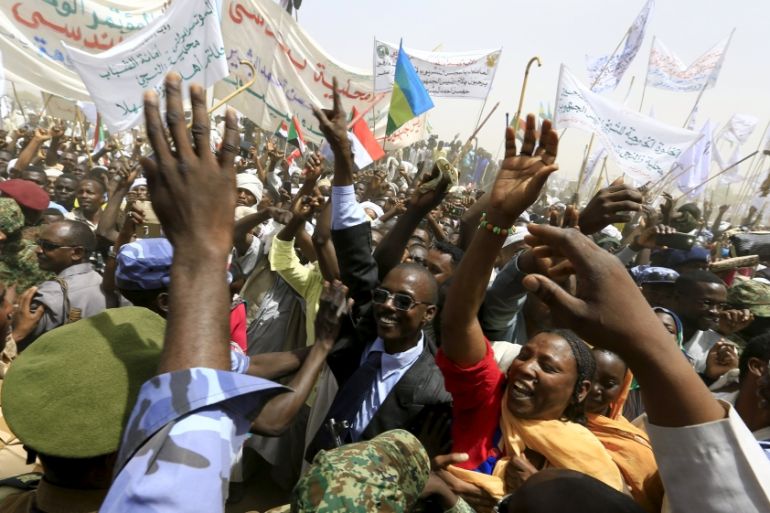Darfur referendum held amid fears of voter apathy
Darfur voters are divided on whether or not the referendum is a priority concern.

Nyala, Sudan – A three-day referendum on the permanent administrative status of Darfur began on Monday amid fears of voter apathy.
Darfur is currently divided into five states. Voters will decide this week whether the area should go back to being one region, as it was until 1994.
Keep reading
list of 4 itemsRussia-Ukraine war: List of key events, day 784
Iraq’s dangerous balancing act between Iran and the US
Russia-Ukraine war: List of key events, day 783
The referendum takes place in 1,400 centres across the 62 localities making up the five states that the region of Darfur is currently divided into: North Darfur, South Darfur, East Darfur, West Darfur and Central Darfur.
More than 3.5 million people registered for the referendum. According to the Darfur Referendum Commission, only people who are 18 years and older, and have been residents of Darfur for three months or more, can vote.
On Sunday, Nyala, the second most populous city in Sudan and the largest in Darfur, was visited by the Darfur Referendum Commission for a final review on how preparations were going.
“All the necessary preparations have been made and the referendum is supported by the local leaders, and we anticipate a smooth process,” said Sidig al-Zain, the head of South Darfur’s Referendum Commission.
The conflict in Darfur has already cost as many as 300,000 lives. That estimate includes the many who died from malnutrition during the worst years of violence.
More than 2.5 million people were driven from their homes.
WATCH: Will the Darfur referendum be credible?
The Darfur administrative referendum is a provision of the Doha Document for Peace in Darfur (DDPD) that was finalised at the All Darfur Stakeholders Conference held in June, 2011.
I don't see the importance of whether Darfur stays divided into states or returns to the one region; it is just not a priority concern now.
Both the government of Sudan and the Liberation and Justice Movement signed a protocol agreement committing themselves to the document that is now the framework for the comprehensive peace process in Darfur.
The referendum is supposed to determine the permanent administrative status of Darfur by offering two options: the creation of a Darfur Region composed of the States of Darfur, or the retention of the status quo states system.
According to the DDPD, in either case, the character of Darfur, as defined by cultural and historical traditions and ties, shall be respected.
Last week, Sudanese President Omar Al-Bashir visited all five states. In Nyala, he said he expected a high turnout that reaffirms the DDPD and the peace process in Darfur – a view that was not shared by some Darfur residents.
“I have not registered for the referendum,” Hawa Idriss, a 38-year-old mother of three from al-Wadi neighbourhood in Nyala, told Al Jazeera. “I cannot afford to leave my work for these things. What’s going to change?”
Mohammed Burma, a student, is a registered voter and intends to cast a ballot in the referendum.
“I will support the states option. I believe it is better, or maybe only because we’re accustomed to it now,” he said.
Meanwhile, the South Darfur State Police said they had deployed more uniformed and plainclothed officers to secure the referendum process. Cars toured Nyala neighbourhoods on the eve of the referendum, urging citizens to participate.
“I don’t see the importance of whether Darfur stays divided into states or returns to the one region; it is just not a priority concern now,” said Gasm Alseed Hamad, a student.
|
|
Haytham Mohammedin, a researcher at the University of Nyala, concurred. “The funds can be used to support development, the building of hospitals, roads, and schools,” Mohammedin told Al Jazeera.
He explained that if it had to be changed, the one-region option was better. “The more states there are, the more spending we have on the state and local government levels. Streamlining spending frees up more possibilities of development, which can then lead to better prospects of peace.”
The one-region option, he added, will also end the conflict over administrative borders among the current Darfur states. “In the one-region scenario, there will be no need for the many conflicts we see today over resources.”
On Sunday, Federal Minister of Media Ahmed Bilal Osman said that the choice is now with the people of Darfur.
“The government renews its commitment to abide by either of the options the people of Darfur decide on Monday when they go to the ballot,” he said.